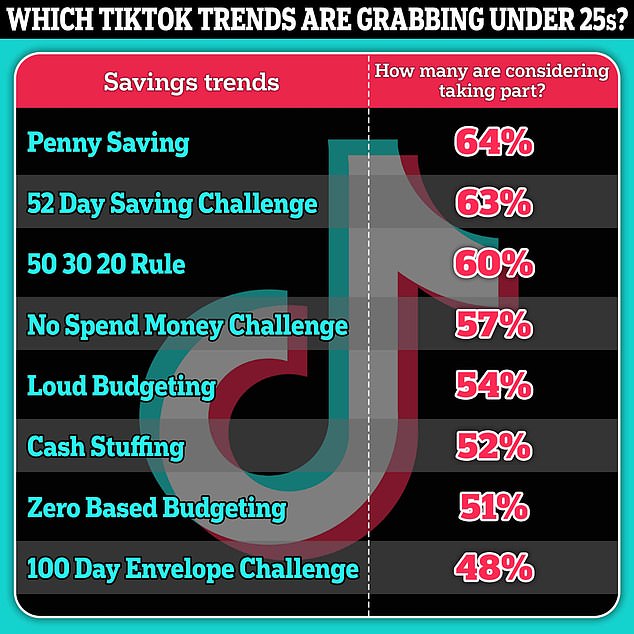According to a study, financial influencers on social media sites such as TikTok are the second most popular place for people under 25 to get financial advice.
More than a third (36%) of people in this age group said they rely on financial influencers or “finfluencers” as their primary source of financial information.
This was right after speaking to a close family member, which 39 percent of under-25s said was their first port of call for financial advice. Less than a tenth say they would turn to a financial services provider for similar help.
However, Gen Z isn’t the only one seeking financial advice online.

Social media generation: Under-25s most likely to follow TikTok savings challenges like ‘noisy budgeting’
According to research from Intuit Credit Karma, around 52% of all UK adults said they already use or would consider using savings advice on social media.
In fact, the majority of UK adults who followed financial advice on social media said advice from TikTok in particular improved their finances.
Financial influencers have a huge following on TikTok, where the hashtag #Fintok – short for financial TikTok – has racked up nearly four and a half billion views.
Videos sharing tips aimed at young people on how to save more money are particularly popular.
Akansha Nath, global managing director of Intuit Credit Karma, said: “As consumers’ appetite for financial advice increases, there has never been more financial information available and from such a wide variety of sources.
“Social media, and particularly TikTok, have become increasingly popular, offering advice in a format that young people in particular are comfortable and confident with.”
The “No Spend” challenge appeals to young users
Often, financial advice gleaned from social media comes in the form of savings challenges and trending financial tips, such as the “no spending money challenge.”
More than half of those surveyed said they were considering or had tried this trend, which involves trying to go as many days without spending money as possible in a month.
Up to 70 percent of those under 25 say they are ready to take on the challenge.


Warning: Akansha Nath warns of misinformation on social media
“Some challenges can be helpful depending on a person’s situation. For example, the “no spend” money challenge can get people to think about where they spend their money and really evaluate whether they are getting the most out of certain purchases,” Nath said.
Just under half, meanwhile, said they would try “zero-based budgeting,” whereby spending would be allocated only to essential expenses, with the rest spared.
The trend that under-25s are most likely to take part in is ‘penny saving’, where participants increase the amount saved each day by 1p, reaching £3.65 on the last day of the year, and saving £667,925 in total.
While young adults are unlikely to turn to financial advisors for financial advice, by turning to TikTok, they might discover that they’re not actually saving as much as they might have been promised.
While more than half said social media tips helped them save more, 39 percent said it made no difference and 2 percent said they were actually worse off.
Should you trust an “finfluencer”?
Despite their popularity, “influencers” may not be the most reliable source of advice.
“There is a lot of misinformation on social media, especially when it comes to investing or cryptocurrency, so it is very important to double check financial advice of any kind that you have seen online,” explains Nath.
“Always be careful when following financial advice from a new source, especially advice that could cause you to lose money or put your finances at risk. »
She said: “The FCA also recently said it is concerned that some influencers are not labeling certain content as adverts or promoting inappropriate financial products without understanding the risk or how they work.
“That’s why it’s really important to double check financial advice of any kind that you’ve seen online.”
A spokesperson for the Financial Conduct Authority told This is Money: “We want to see more young people getting engaged with their money, and social media can be a useful resource to help you get started and find support. But financial services can be complex, and people should be wary of being misled by scams or dubious advice promoting specific investments.
“We’re updating our guidelines for businesses and influencers who sell financial products online so they can stay on the right side of our rules. For those who promote products illegally, we will take action against you.
Some links in this article may be affiliate links. If you click on it, we may earn a small commission. This helps us fund This Is Money and keep it free. We do not write articles to promote products. We do not allow any commercial relationships to affect our editorial independence.


